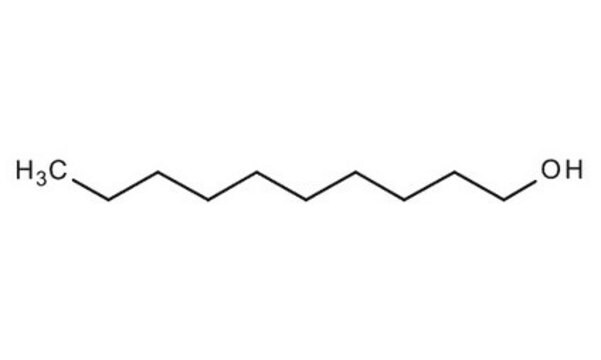126799
1-Dodecanol
reagent grade, 98%
Sinónimos:
Alcohol C12, Dodecyl alcohol, Lauryl alcohol
About This Item
Productos recomendados
grado
reagent grade
Nivel de calidad
densidad de vapor
7.4 (vs air)
presión de vapor
0.1 mmHg ( 20 °C)
Ensayo
98%
Formulario
solid or liquid
temp. de autoignición
500 °F
lim. expl.
4 %
índice de refracción
n20/D 1.442 (lit.)
bp
260-262 °C (lit.)
mp
22-26 °C (lit.)
solubilidad
water: slightly soluble 1 g/L at 23 °C
densidad
0.833 g/mL at 25 °C (lit.)
cadena SMILES
CCCCCCCCCCCCO
InChI
1S/C12H26O/c1-2-3-4-5-6-7-8-9-10-11-12-13/h13H,2-12H2,1H3
Clave InChI
LQZZUXJYWNFBMV-UHFFFAOYSA-N
¿Está buscando productos similares? Visita Guía de comparación de productos
Descripción general
Aplicación
Palabra de señalización
Warning
Frases de peligro
Consejos de prudencia
Clasificaciones de peligro
Aquatic Acute 1 - Aquatic Chronic 1 - Eye Irrit. 2
Código de clase de almacenamiento
11 - Combustible Solids
Clase de riesgo para el agua (WGK)
WGK 2
Punto de inflamabilidad (°F)
249.8 °F - closed cup
Punto de inflamabilidad (°C)
121 °C - closed cup
Elija entre una de las versiones más recientes:
¿Ya tiene este producto?
Encuentre la documentación para los productos que ha comprado recientemente en la Biblioteca de documentos.
Los clientes también vieron
Nuestro equipo de científicos tiene experiencia en todas las áreas de investigación: Ciencias de la vida, Ciencia de los materiales, Síntesis química, Cromatografía, Analítica y muchas otras.
Póngase en contacto con el Servicio técnico










